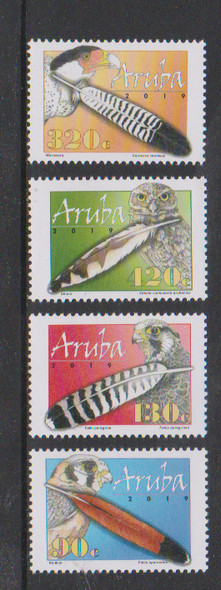Description
The types of Butterflies illustrated on each stamp were selected from those at the Aruba’s Butterfly Farm.
At this Farm you can appreciate the life cycle from egg to caterpillar to chrysalis also known as “pop” to butterfly
90c: Battus polydamas-Polydamas Swallowtail- Gold Rim Swallowtail
Also known as the tailless swallowtail, is a species of butterfly in the family Papilionidae. It's a large butterfly, typically 3½ to 4½ inches across, mostly black when viewed from the top, with two yellow bands that run along the outer edge of each wing. The underside is more colorful — red spots run along the length of the abdomen; the hind wings more of a brown, with wavy red spots mixed in along the edges with dark arch-shapes and yellows and white. But the gold rim's most distinctive feature is the one that it doesn't have, the swallow tail.
Gold rim swallowtails live as far south as Argentina.
One other thing stands out about gold rim swallowtails: their diversity.
130c: Hypna Clytemnestra- Silver-Studded Leafwing
Hypna is a butterfly genus of the family Nymphalidae. It is monotypic and also the largest member of the tribe Anaeini. This “leafwing butterfly” is quite uncommon. The upper sides of the forewings are black, with a few white spots on the margins and two large white transverse bands. The uppersides of the hindwings are mainly brown. The undersides mimic dead leaves, ranging from dark brown to whitish. Larvae feed on Croton floribundus (Euphorbiaceae), while adults feed on rotting fruits.
220c: Pachliopta aristolochiae-Red-Bodied Swallowtail
The common rose, is a swallowtail butterfly belonging to the genus Pachliopta.
It is a common butterfly which is extensively distributed across south and Southeast Asia
The upperside of male is velvety black.
Females are similar to the males; they differ from the male only in the comparatively broader wings and this is most conspicuous in the forewing.
420c: Papilio rumanzovia-Scarlet Swallowtail
The scarlet Mormon or red Mormon, is a butterfly of the family Papilionidae. Especially the females are quite variable in marking. The male is very similar to the male of Papilio ascalaphus, but unlike this species does not have a tail on the rear wing. Both the male and the female have signal red markings on the underside of the wings. The butterfly has a wingspan of 12 to 14 inches.







